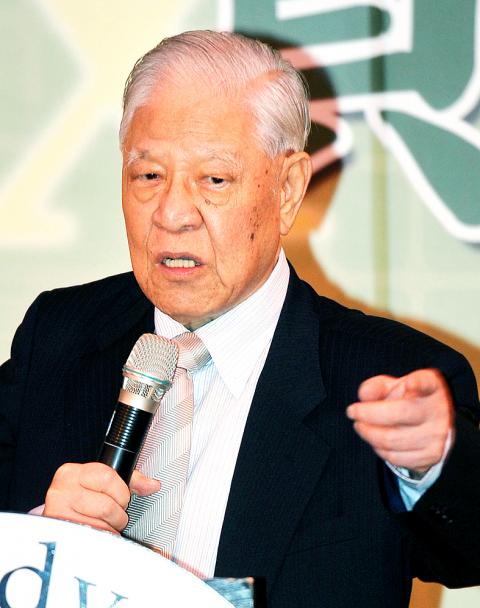The trial of former president Lee Teng-hui (李登輝) on charges of embezzling state funds is scheduled to begin on Oct. 21, the Taipei District Court announced yesterday.
Judge Hu Tsung-kan (胡宗淦) will preside over the case, the district court said.
The Supreme Prosecutors’ Office Special Investigation Division (SID) announced that Yang Jung-tsung (楊榮宗) and Cheng Shen-yuan (鄭深元) are set to be the prosecutors.

Photo: Fang Pin-chao, Taipei Times
As the indictments pertain to national security matters, the hearing is to be held behind closed doors, the court said, adding that security measures were already in place for Lee’s hearing.
The SID accuses Lee and Liu Tai-ying (劉泰英), an aide, of illegally siphoning US$7.8 million from secret diplomatic funds used by the National Security Bureau and laundering the money during his terms in office from 1988 to 2000.
The SID said Lee used those funds to set up the Taiwan Research Institute, which later made him honorary chairman.
The think tank used some of the funds — allegedly laundered by Ruentex Group (潤泰集團) — to purchase luxury offices in downtown Taipei for Lee and Liu, which were also built by the conglomerate, prosecutors said.
They also allege that Liu pocketed US$440,000.
If convicted, the 88-year-old former president could face at least 10 years in prison.
Lee has denied any involvement in corruption.

ENDEAVOR MANTA: The ship is programmed to automatically return to its designated home port and would self-destruct if seized by another party The Endeavor Manta, Taiwan’s first military-specification uncrewed surface vehicle (USV) tailor-made to operate in the Taiwan Strait in a bid to bolster the nation’s asymmetric combat capabilities made its first appearance at Kaohsiung’s Singda Harbor yesterday. Taking inspiration from Ukraine’s navy, which is using USVs to force Russia’s Black Sea fleet to take shelter within its own ports, CSBC Taiwan (台灣國際造船) established a research and development unit on USVs last year, CSBC chairman Huang Cheng-hung (黃正弘) said. With the exception of the satellite guidance system and the outboard motors — which were purchased from foreign companies that were not affiliated with Chinese-funded

PERMIT REVOKED: The influencer at a news conference said the National Immigration Agency was infringing on human rights and persecuting Chinese spouses Chinese influencer “Yaya in Taiwan” (亞亞在台灣) yesterday evening voluntarily left Taiwan, despite saying yesterday morning that she had “no intention” of leaving after her residence permit was revoked over her comments on Taiwan being “unified” with China by military force. The Ministry of the Interior yesterday had said that it could forcibly deport the influencer at midnight, but was considering taking a more flexible approach and beginning procedures this morning. The influencer, whose given name is Liu Zhenya (劉振亞), departed on a 8:45pm flight from Taipei International Airport (Songshan airport) to Fuzhou, China. Liu held a news conference at the airport at 7pm,

Taiwan was ranked the fourth-safest country in the world with a score of 82.9, trailing only Andorra, the United Arab Emirates and Qatar in Numbeo’s Safety Index by Country report. Taiwan’s score improved by 0.1 points compared with last year’s mid-year report, which had Taiwan fourth with a score of 82.8. However, both scores were lower than in last year’s first review, when Taiwan scored 83.3, and are a long way from when Taiwan was named the second-safest country in the world in 2021, scoring 84.8. Taiwan ranked higher than Singapore in ninth with a score of 77.4 and Japan in 10th with

Authorities yesterday elaborated on the rules governing Employment Gold Cards after a US cardholder was barred from entering Taiwan for six years after working without a permit during a 2023 visit. American YouTuber LeLe Farley was barred after already being approved for an Employment Gold Card, he said in a video published on his channel on Saturday. Farley, who has more than 420,000 subscribers on his YouTube channel, was approved for his Gold Card last month, but was told at a check-in counter at the Los Angeles International Airport that he could not enter Taiwan. That was because he previously participated in two